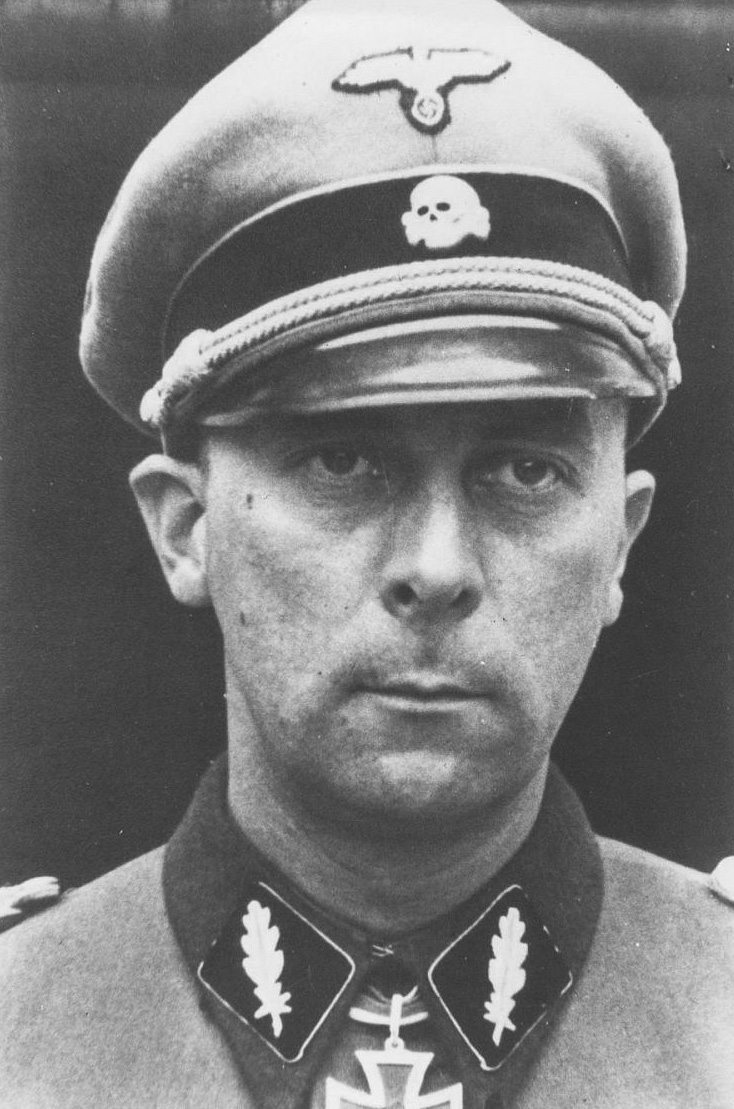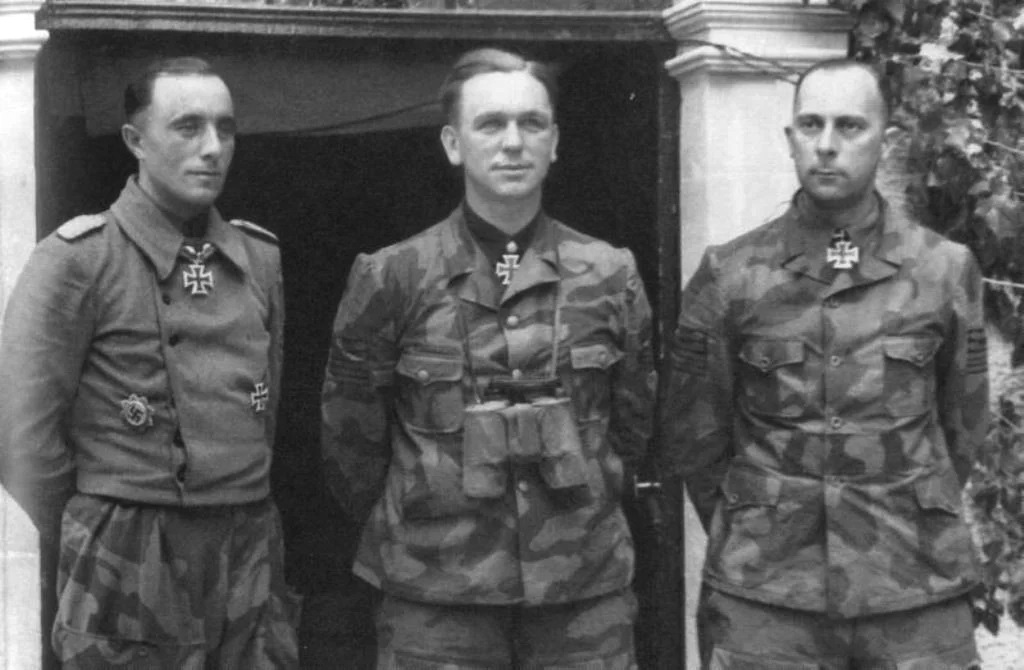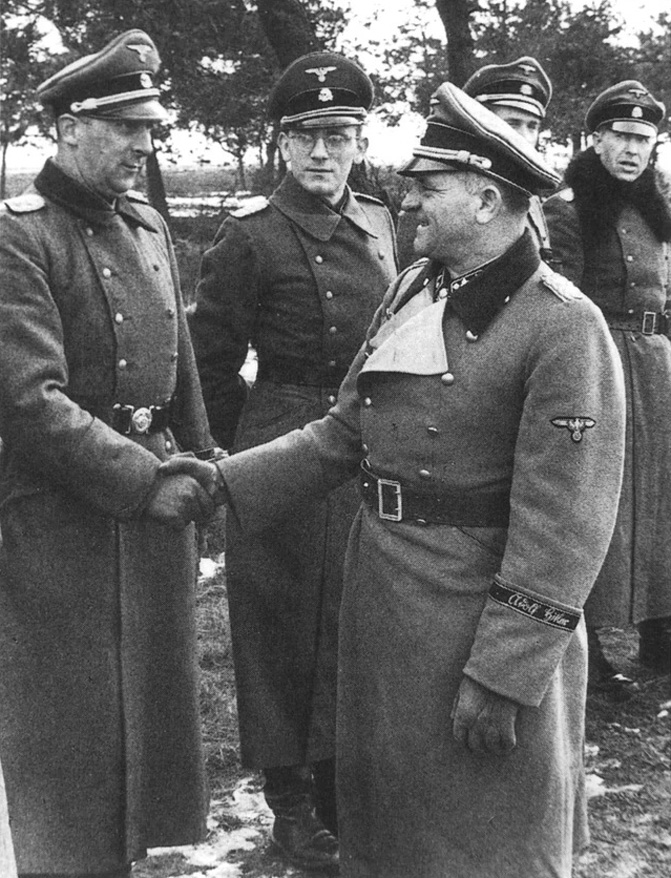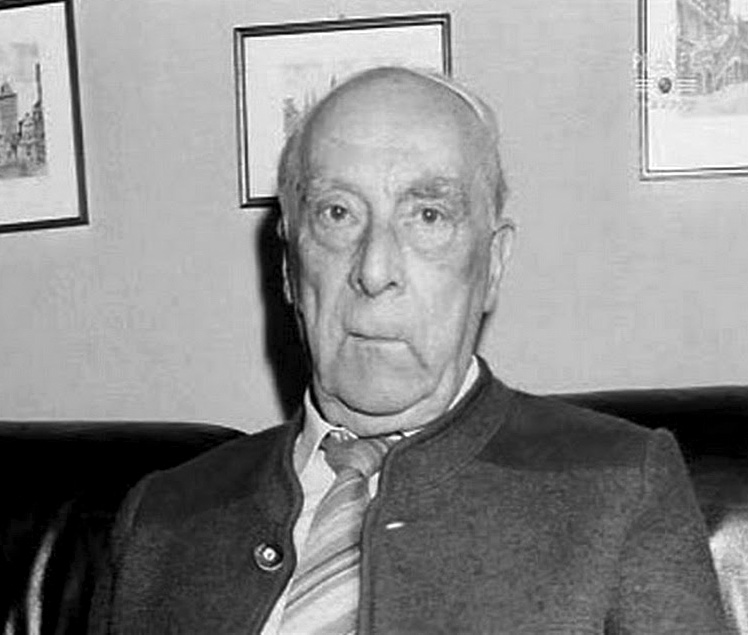
Interview with General Wilhelm Mohnke, LSSAH Knight's Cross winner, Rundsburg, 1990.
Mohnke was personally made Kommandant (Battle Commander) by Adolf Hitler himself for the defense of the center government district of Berlin (Zitadelle sector).
This all important task included the Reich Chancellery and Führerbunker. This led him to form Kampfgruppe Mohnke, composed of a variety of SS groups, its core being the legendary 800 men of the Leibstandarte (LSSAH) SS Guard Battalion, Adolf Hitler’s personal guards.

[Above: Wilhelm Mohnke.]

General Mohnke, I wish to thank you for letting me greet you and speak with you. I would like to start if I may by asking what attracted you to join the SS?
Wilhelm: Yes my young sir, for me that is simple to answer. In the Germany of that time there was only one way to go if you wanted a good life. It was clear by 1930 that Hitler was going to be the leader. The NSDAP was gaining more votes than any other party. It was Germany's destiny to bring forth Hitler, who saved the nation from the Red Terror.
At the same time Himmler was building up a very elite guard within the party that was loyal only to Hitler. Membership was only offered to the very best of German blood and I felt I belonged. I applied for membership in 1931, and never looked back. I felt like I was part of an order of brothers who were sworn to protect the Führer and who swore the oath only to him.
For this I must say I have no regrets and would willingly do it again, no matter the high cost we had to pay in the end.
I understand you were active in the battle of Poland. Can I ask what it was like for you and what did you think of the Polish soldier?
Wilhelm: Yes, it was our first taste of the war. I was in the regiment Leibstandarte when we crossed the border. At first there was little action, our drive consisted of liberating town after town, and being welcomed as liberators. I still remember seeing the people crying when we arrived. The Poles had been harsh to many Germans who had been forced to live under their rule.
Comrades had the misfortune to see some of the results of the roving militias who hunted down Germans. No one here wants to talk about this now; it is only on us who saw these things to tell you the truth. Some in Poland had a hatred of anything German; they waged a war on Germans even right after the first war.
When Hitler started to talk to them about rejoining the lands with Germany, which the Versailles Treaty stole, they lost their minds. Instead of listening and working out trade or other compensation, they talked of war. I know from speaking to v. Ribbentrop, his father worked feverishly to bring a peaceful resolution to the issue.
The Poles refused, and unleashed hate on the innocent civilians who stayed and did not flee to the Reich. As for the Polish soldiers, I have respect for them, as they fought hard even when all hope was lost. The army did not lose honor, but some individual soldiers acted as criminals, which had to be punished afterward.
Something I will say is that we treated them very well in the end. We allowed them to march as a proud army into captivity, and then they were disarmed and most sent home. These stories they are saying today can not be true and are meant to smear us as cowards and criminals. I was wounded so I did not see the conclusion of the campaign, but my comrades filled me in. I was sent to recover in the protectorate [Bohemia and Moravia (Czechoslovakia)-ed].
How were you treated in the protectorate?
Wilhelm: I was there for the reunification in 1938, and then we were asked to protect the rest of the country. It was a loyal ally to Germany right up to the end, when the partisans and Soviets flooded in. Then they attacked Germans who stayed put, killing many innocents.
Many SS men were sent here to recover from wounds, and we were treated very well. I would have expected nothing less as the people were happy to be prosperous under the National Socialist regime. This was territory that Germany safeguarded and was under the command of Heydrich. I met him in the hospital; he and other members came to wish the wounded well. I was impressed with him. He later went on and flew fighters while a general, can you imagine?
He was a man of many talents that is for sure, I understand you met Lina [Heydrich]? She was a good woman. The young ones brought us cards, and the ladies made us cakes and sweets. I saw a people who were not oppressed and seemed very happy living under German rule.
We would go for walks and I saw no bad looks, people liked having our money that is for sure. We went to eat, the movies, and went shopping. For them to say we oppressed and terrorized them is just not the truth.
You fought in France as well; can I ask the same question? How was it and how did you view the French?
Wilhelm: Well sir, after I healed and returned to my unit we had much training to do. Poland showed we had to refine combat tactics and create cohesion. Many of us pushed for Panzers to be added here, like the army. They were the hammer blow that we needed to break open defended lines.
The problem we had was there were too few to go around, but Himmler and the generals had the same vision. Later we fielded the best Panzer divisions because of the training the SS men had. France was much more of a hard fight than Poland; it was here we met the British.
They could be very stubborn to beat, at times fighting to the last man. In this fight the main German thrust cut the Allies in half, and gave them a big defeat. We had the northern route where the majority of their strength was located. So the LAH had a hard time of it. So did the Totenkopf, they suffered very heavy losses due to British trickery, it is said.
Once we herded the Allies into the Dunkirk pocket, we knew it was over. The roads were clogged with French refugees whom we had to often help. We had no animosity to the French, they were our old enemies but I remember a speech by Himmler. He told us this war was a racial war for the survival of Europeans and we needed to treat them as racial brothers, which we did. You will not find that in your school books my sir.

[Above: Three knights: (left to right) Erich Olboeter, Kurt Meyer, Wilhelm Mohnke.]
Did you ever see action in the East?
Wilhelm: No young man, I was wounded quite badly in the Balkans, and then placed in reserve where I oversaw the replacement unit of the LAH. I did this chore until 1943 when the new Hitlerjugend division was created. I was given a command role and helped build these boys into soldiers.
I understand you were in Normandy during the beginning of the invasion, what was it like? Is it true only small forces of German soldiers were available to oppose the landings?
Wilhelm: Yes I was in Normandy when the invasion started; it was a very hard battle for us. We trained our boys well, and they had very high morale. The division was one of the few with Panzers to be anywhere close to the coast. Because of the indecisiveness of the generals in charge we missed an opportunity.
I have said I wonder what side they were on, as they aided the Allies in every way they could then blamed the Führer for mistakes. Yes, I think it is true to say that the landings were opposed by only a handful of frontline soldiers. We saw the glaring holes in the defenses, which made it possible for the Allies to mostly walk off the boats and take large areas without much resistance.
Only certain areas that had artillery with infantry support put up stiff resistance, and these were few and far between. Imagine what we could have done if the Panzers and men were right there to hit the enemy as they landed. Our massed guns could have picked off the boats and made the ships pull back.
Alas it was not meant to be, fate played a cruel trick on us. Our forces were spread all over France, and took days to get into action. The 12th right away was forced on the defensive since the Allies gained a foothold immediately after landing. Any counter thrusts were met with ship fire and air attacks. Our boys went on the defensive to smash any attempts to move further inland.
The Allies gave a very good account of themselves with their vastly superior forces. We had problems getting the very basic supplies brought up. Our boys had to move at night to hand out supplies as daytime belonged to the Jabos [German slang for an Allied fighter-bomber-ed]. Those dammed guys would shoot anything on the roads, even ambulances and civilians.
I was at a command post when I saw British pilots attack French refugees who were coming back to Caen, against our wishes, to see the damage. The Allies bombed many Norman towns so they could deny us cover. I saw the many corpses that were left after these actions, which our boys had to help bury.
I understand you won the Knight’s Cross for actions in Normandy?
Wilhelm: Yes that is true, it was more precisely for holding open retreat areas in the pocket. Our forces were able to hold the Allied armada for 2 months in the Bocage [a rural area of western France-ed.], but they had overwhelming might. They kept getting stronger while we became weaker. By August they had built up enough forces to breach our lines in two main areas.
Then they threatened us with encirclement so we pulled back to save the armies. The HJ Division had the duty to hold open an area to allow for the bulk to get out. Against hard attacks from both land and air we held open a corridor that saved many comrades. I was very proud of my boys and the strong sense of duty they possessed.
For leading this, and saving valuable equipment, I was awarded the Knight's Cross.
General Mohnke, if I could be permitted, I would like to ask you about a sensitive subject, that is the Allied war crimes claims against the SS. I know the LSSAH is accused of shooting British prisoners in France, Canadians in Normandy, and Americans at Malmedy. Could I ask for your thoughts regarding these claims?
Wilhelm: Yes, young man, these are very serious claims made against us that just will not die. I want you to know it has been made very clear to many of us that we are not to try to deny these versions as told by the victors of the war. For these reasons I do not discuss the topic unless it is with a trustful friend.
You must appreciate what I am willing to share with you because I must be careful. I was hounded by Allied press and officers after the war. Your media, who was not used to German customs and ways, thought us to be ill-mannered and vulgar because we were incensed at their lack of objectivity. They called us Nazi bullies because we told them they were liars and servants of dishonest interests.
We were never allowed to fully rebut any of these claims regarding the shooting of prisoners. They used forced confessions from our men to try to implicate anyone they wished to frame. A soldier under my command came to me to apologize, saying the Americans made him promises if he would say bad things about my command.
These boys had been through hell and only wanted to get home to see their loved ones. The Allies made that promise if they would agree to turn on their comrades. Many did this, and it caused the deaths of innocent men. I can not be angry, as it is human nature to protect yourself and the ones you love.
I have read some of the statements from those who say they survived such encounters and for me they do not make sense. These stories all have the same goal, which is to make the SS out to be an evil force, bent on racial extermination. They use the war crimes stories as a basis to attack people who see race or wish for racial separation. It’s always the same people who have pushed these stories.
The stories the survivors tell just don't make sense, they tell of herding prisoners into barns, throwing grenades, etc, it suggests deliberate cold-bloodedness which these young men did not possess. There were standing orders that taking prisoners is important for intelligence, and it was the correct thing to do when the fighting was finished.
I saw with my own eyes the vast columns of prisoners the LAH was bringing in. There would have been absolutely no reason to kill a defeated enemy. It is for this reason I surmise the survivors are lying, making up stories about murder to get back at us.
There were many small actions, and I know personally the British would hide in homes and fire on us, and then were wiped out with grenades. Was this a massacre because they were fighting from a basement?
I will tell you my men went to great lengths to take them prisoner, at times being careless with their lives. We never viewed them as our enemies, just misguided brothers whom we had to fight. To accuse us of deliberately killing them is an insult to the good qualities SS men possessed. The same goes with the Canadians; there was no reason to not take prisoners.
There is one exception I must mention to you. The Canadians were on my watch with HJ, and I will state again there were no orders ever given to not take prisoners. There were, however, orders that were captured that revealed a Canadian unit was not taking SS prisoners. I remember that, and the amount of arguing it brought about, which Meyer put a stop to.
In spite of the Canadian order, which was thought erroneous or dubious, our orders were clear that prisoners will be taken. I have heard it claimed that a few boys had shot down prisoners before this order was sent out. This is something that I never received a yes or no answer to due to the heavy fighting. However I still can not come to believe these enemy stories.
As for Malmedy, it was no massacre at all; I have spoken to many comrades who were there. The Americans were a bunch of undisciplined cowboys who tried to pick up the fight after seeing the confusion of the guards. Some grabbed guns and started to run, then were fired on, causing others to open fire on the whole group.
A tragic mistake caused by the undisciplined Americans who invited return fire which hit standing soldiers. Again, there were no orders to shoot prisoners, only to treat them well and care for their wounds as best we could.

[Above: Wilhelm Mohnke shaking hands with Sepp Dietrich during an inspection of the 12th SS Hitler Youth, 1943/44.]
So do you feel the image of the Waffen-SS as war criminals is unjustified?
Wilhelm: Yes I do, we were simply soldiers who answered the nation's call in a time of war. We fought with honor and civility, showing mercy to enemies who clearly were not deserving of it. They have caused us to even fight each other, and our own nation. The idea some comrades put forth is the Totenkopf were the bad guys and everyone else was good, all to try to placate the victors and to seem less guilty.
They should not do this as the entire SS complex is blameless; we did what we needed to do to try to win a war. If it meant putting people who were deemed to be enemies in camps to work, then it had to be. There was no plan to kill anyone; they were far too valuable to us as workers.
I went to one of these camps during the war, and saw young boys sewing uniforms. Everyone who could work, worked. They all were very happy and looked well-treated and fed. I do not understand all these stories that came out after the war. The Allies are masters at propaganda, and convinced the people to believe in the impossible.
I wonder if some of the producers of anti-Nazi shows know just how much they actually awaken people to the other view. They show happy, healthy people doing work and it makes no sense to kill people helping you. Just like killing prisoners would only invite your enemies to do the same to you.
I know you met Hitler, notably in the bunker. Can I ask if the stories are true about him yelling like a crazy man?
Wilhelm: I did meet the Führer many times; I was on his original guard. I can tell you he was a very kind, calm, and intelligent leader. Even seeing him in 1945 in the bunker, at his worst, he still seemed like the leader I knew. He was sad, and I could see in his eyes the look of defeat. I did not hear or witness any of the outbursts others have said to have seen.
Remember that telling the truth about the Führer will not sell books or be made into any movies. The world has been told he was only one way, and that is the only way they will show him. Anything else will be suppressed and buried. In truth even up to his last day he was a great man who was forced into a war with the world powers.
I think we all have a hope that someday, and I know I will not see that day, as I have lived it once already, where the truth comes out. He will not always be seen as the bad man and us as his lackey followers. A time will come in the future where truth will bring down the hate and lies of our enemies, no matter how solid they may seem.

[Above: An old warrior, the war many years behind him, Wilhelm Mohnke in his final years of life.]
Back to Interviews







